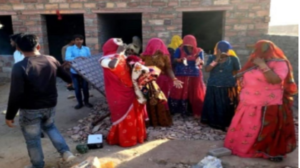
Demolition of Houses of Pak Hindu Refugees in Rajasthan

INTRODUCTION: WHAT IS THE ISSUE?
In Rajasthan, government clarifies that Pakistani refugees have illegally captured the land and the land allegedly belonging to the state government’s urban improvement trust [UIT]. The order was passed by the collector to demolish the houses of refugees.
More than 50 houses of refugees from Pakistan built on government land in Jaisalmer were demolished. Collector said that locals had complained to the government over the illegal structures, and also said the migrants built illegal houses along the banks of Jaisalmer Amar Sagar Lake, stopping the inflow of water into the LAK. They also said notices were sent to migrants before government action against their homes.

The protestors claimed that the government land was illegally sold to these Pakistani refugees living on long-term visas. A case of fraud has been registered against those involved in the illegal selling of government land. Meanwhile, the refugees have again become homeless as there is no clarity of their relocation and which make migrants face the violation of the right to life and liberty [article 21 of the Indian constitution].

RIGHTS OF REFUGEES IN INDIA
India, being a signatory to multiple international instruments on Human Rights, is persistently striving to fulfil its concerned obligations diligently in all possible manners. The constitution of India is engrained in the Universal Declaration of Human Rights [UDHR].
As India is not a signatory of the UN Refugees Convention 1951 but it follows and respects it and provides refuge to all. In India, under the passport act of 1920, refugees have the right to produce before the court and the next court will deport them once the origin state confirms. Along with it state and union governments also have the right to deport.
At present, refugees were treated as per all laws applied to foreigners were also applied to refugees. India does not have any specific legislation dealing with the problem of refugees and asylum seekers. Some acts are deals with the refugee provisions are The Foreigners Act of 1946, The Registration of Foreigner Act of 1939, The Passport [entry into India] Act of 1920, and The Citizenship Act of 1955.

VIOLATION OF RIGHTS OF REFUGEES
In Rajasthan, over 50 makeshift houses in the Amar Sagar area which were deemed to be encroachments were allegedly demolished by the authorities on the orders of Jaisalmer collector Tina Dabi. Over 150 Hindu migrants from Pakistan, including kids, are now reportedly homeless.
Refugees claimed that they had migrated to India after persecution in Pakistan. Before they were facing atrocities in Pakistan and now they are facing atrocities in India. The protesters pointed out that the government of Rajasthan is opposing both the Citizenship Amendment Act [CAA] as well as the National Register of Citizens [NRC]. They also stated that they were living in India for the last 5-6 years but they had no Indian Citizenship so, they were not able to avail any facility.
The rights of refugees are highly ignored in Rajasthan; they are suffering from very basic needs which include food, shelter and clothing. Not only rights of refugees are ignored but also the acts which provide indemnity to these people are also neglected.
In 2019, the government passed the citizenship amendment act that pledged to give citizenship to Hindus, Sikhs, Jains, Buddhists, Parsis and Christians who belong from Bangladesh, Pakistan and Afghanistan who had come to India till December 31, 2014.
Even in the Nehru Liaquat agreement, it was clearly stated that after the partition of India the Hindus who were there, if they come to India for some reason such as due to harassment or any atrocity then the state was obliged to not only grant citizenship to Hindus of Pakistan but also rehabilitated them and it will be the job of the government to provide all the facilities to them.

CONCLUSION
In this case, migrants are from Pakistan, they came to India to escape from the discrimination against the minorities in Pakistan but they were not aware that they face such problems in India as well. The state government does not issue any guidelines regarding the resettlement of migrants who had not been granted citizenship in India, so it should be taken into concern.
The implementation of laws or acts should be done at ground level rather than on paperwork. The government and officials should portray some empathy, tolerance and compassion towards weaker sections of the state and some specific provisions should be made for refugees to protect their rights.
REFERENCES
• https://prsindia.org/billtrack/the-citizenship-amendment-bill-2019
• https://www.jagrantv.com/en-show/tina-dabi-rajasthan-case-tina-dabi-stuck-for destroying-the-homes-of-pakistani-hindu-migrants-rc1042165
• https://www.dailyo.in/news/on-tina-dabis-order-homes-of-150-hindu-migrants-bulldozed in-rajasthan-39762
• http://www.worldlii.org/int/journals/ISILYBIHRL/2001/7.html • https://www.indianbarassociation.org/indias-refugee-policy/







